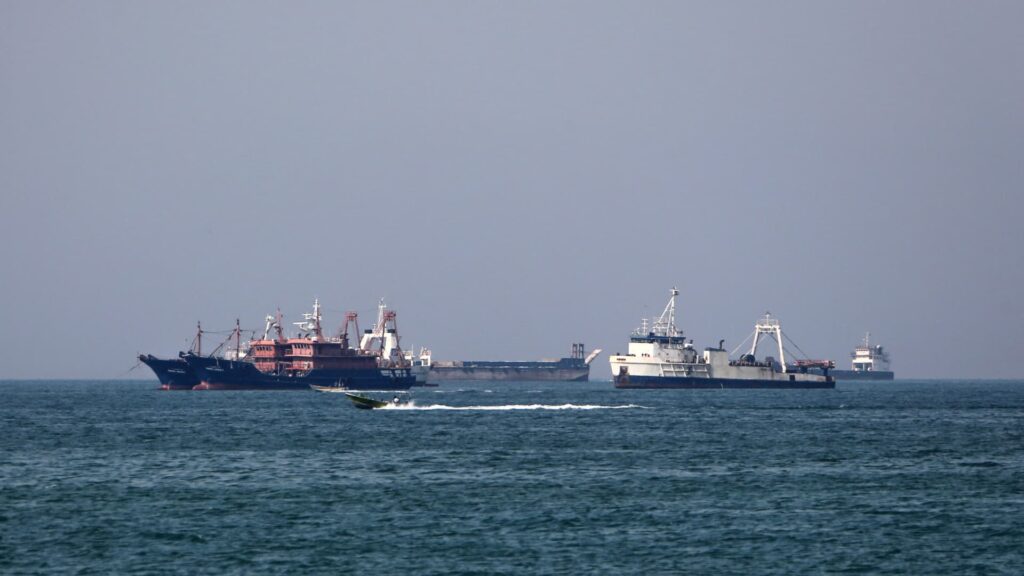Cargo ships sail in the Gulf off the Iranian port city of Bandar Abbas, which is the main base of the Islamic republic’s navy and has a strategic position on the Strait of Hormuz, on April 29, 2019.
ATTA KENARE | AFP | Getty Images
Iran may be threatening to close the Strait of Hormuz but experts told CNBC that it’s also the one with the most to lose.
In major move after U.S. struck Iranian nuclear sites, the country’s parliament on Sunday reportedly approved the closure of the Strait of Hormuz, risking alienating its neighbors and trade partners.
The decision to close the waterway now rests with the the country’s national security council, and it’s possibility has raised the specter of higher energy prices and aggravated geopolitical tensions, with Washington calling upon Beijing to prevent the strait’s closure.
Vandana Hari, founder of energy intelligence firm Vanda Insights, told CNBC’s “Squawk Box Asia” that the possibility of closure remains “absolutely minimalistic.”
If Iran blocks the strait, the country risks turning its neighboring oil producing countries into enemies and risks hostilities with them, she said.
Furthermore, a closure would also provoke Iran’s market in Asia, particularly China, which accounts for a majority of Iranian oil exports.
“So very, very little to be achieved, and a lot of self inflicted harm that Iran could do” Hari said.
Her view is supported by Andrew Bishop, senior partner and global head of policy research at advisory firm Signum Global Advisors.
Iran will not want to antagonize China, he said, adding that disrupting supplies will also “put a target” on the country’s own oil production, export infrastructure, and regime “at a time when there is little reason to doubt U.S. and Israeli resolve in being ‘trigger-happy.'”
Clayton Seigle, senior fellow for Energy Security and Climate Change at the Center for Strategic and International Studies said that as China is “very dependent” on oil flows from the Gulf, not just Iran, “its national security interest really would value stabilization of the situation and a de-escalation enabling safe flows of oil and gas through the strait.”
There are currently there are no indications of threats to commercial shipping passing the waterway, according to the Joint Maritime Information Center. “U.S. associated vessels have successfully transited the Strait of Hormuz without interruption, which is a positive sign for the immediate future.”
Impact of potential disruptions
The Strait of Hormuz is the only sea route from the Persian Gulf to the open ocean, and about 20% of the world’s oil transits the waterway. The U.S. Energy Information Administration has described it as the “world’s most important oil transit chokepoint.”
“Iran’s operations in and around Hormuz are unlikely to be ‘all or nothing’ – but instead move along a sliding scale from total disruption to none at all,” said Signum’s Bishop.
“The best strategy [for Iran] would be to rattle Hormuz oil flows just enough to hurt the U.S. via moderate upward price movement, but not enough to provoke a major U.S. response against Iran’s oil production and export capacity,” he added.
On Sunday, Patrick De Haan, head of petroleum analysis at GasBuddy, said in a post on X that pump prices in the U.S. could climb to $3.35-$3.50 per gallon in the days ahead, compared to the national average of $3.139 for the week of June 16.
Should Iran decide to close the strait, it would likely use small boats for a partial blockade, or for a more complete solution, mine the waterway, according to David Roche, strategist at Quantum Strategy.
In a Sunday note, S&P Global Commodity Insights wrote that any Iranian closure of the strait would mean that not only Iran’s own exports will be affected, but also those of nearby Gulf nations, such as Saudi Arabia, the United Arab Emirates, Kuwait and Qatar.
That would potentially remove over 17 billion barrels of oil from global markets, and affect regional refineries by causing feedstock shortages, the research firm said. The disruption to supply will impact Asia, Europe as well as North America.
Besides oil, natural gas flows could also be “severely impacted,” S&P said, with Qatar’s gas exports of about 77 million metric tons per year potentially unable to reach key markets in Asia and Europe.
Qatar’s LNG exports represent about 20% of global LNG supply.
“Alternative supply routes for Middle Eastern oil and gas are limited, with pipeline capacity insufficient to offset potential maritime disruptions through the Persian Gulf and Red Sea,” S&P added.
The Commonwealth Bank of Australia pointed out that “there is limited scope to bypass the Strait of Hormuz.” Pipelines in Saudi Arabia and the UAE have only a spare capacity of 2.6 million barrels a day between them, while the strait oversees the transport of an estimated 20 million barrels of oil and oil products per day, the bank said in a note.

All these present upside risk to energy prices, with Goldman Sachs estimating that the market is pricing in a geopolitical risk premium of $12.
If oil flows through the strait were to drop by 50% for one month and then were to remain down by 10% for another 11 months, Brent is forecast to “briefly jump” to a peak of around $110, Goldman said.
Brent oil futures currently stand at $78.95 per barrel, while West Texas Intermediate futures were trading at $75.75.

